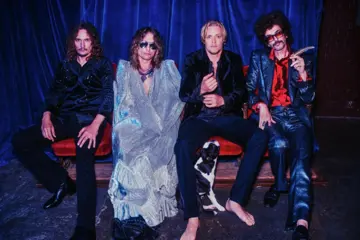Back in his adopted home of New York City, British mood creator Simon Green, better known as Bonobo, is enjoying being still for the first time this year. He's “switched on all the machines” to work on some new stuff, and is “just trying to recover; my whole sleep pattern is a mess at the minute,” he chuckles.
Such an issue tends to arise when one creates a record as robust and downright beautiful as The North Borders. Exploring sounds more beat-driven and electronically focused than on his four previous releases, the expansive LP has sidestepped the live jazz and trip hop that earmarked his earlier output, exploring earthy layers and textures instead. And through the right speakers or headphones, it can transport the listener to a musical utopia.
“Being 2013 it's good to [progress],” remarks Green. “But I still think there's the same principle there; I use the same approach to music, just with a different palate of sounds. I'm more informed by UK bass music [right now], but there's still soulful aspects in there.
“But you never know what's going to happen when you put something out, so it feels amazing because it's been over ten years since the first record, and [Bonobo] still seems to be expanding and moving upwards. I've been amazed by the response to [The North Borders], especially now that there seems to be this culture of blowing up very quickly with one record, and that culture almost seems to be encouraged. It feels refreshing to know that there are still people who will follow someone further than one hype record.”
Don't miss a beat with our FREE daily newsletter
Long before 1999, when, as a 23-year-old, he first credited a track to Bonobo (Terrapin), Green has used music as an escape. And since that initial cut found its way onto the compilation When Shapes Join Together, put out through pioneering UK indie label Tru Thoughts, he has buried that ideal beneath everything he's produced.
“I find music very immersive and therapeutic, and I start getting a bit twitchy if I haven't made [anything] for a little while,” Green says. “It's a very escapist thing, it's very meditative; it's a good way of zoning out into something else. That's how I use it and that's the way I work.”
But as the creator, it's hard to remain objective. Luckily for Green, if a Bonobo track makes him move, then he's confident it's something special. “It's one of those things, you get a sense when you listen back to something the day after,” he explains. “I always find if I'm stood up in the studio it's good, not sat down. If I'm up and jigging about, pacing around the room when I'm listening to it, then I know it's a good thing.”
Visiting us over the New Year's period as part of Falls Festival, Green will be presenting his Bonobo catalogue with a full six-piece band, including live drums, woodwind players, and vocals courtesy of Szjerdene, a gorgeous London singer who appears on two of The North Borders tracks: Towers and Transits. “We're at the end of the year so the show is really tight, so it's going to be a good time to see it,” adds Green.
And as the music is fleshed out around him, the 37-year-old will man the bass guitar and keys, while also operating Ableton, an experience worlds away from the process he carries out when writing and producing, his home studio the isolated environment he prefers when creating away from the stage.
“From the first album, which was basically [done] in my bedroom, to now, which is just another room in the house, it's [been] essentially the same process – I do everything from home. I think about the idea of having a studio elsewhere; it would be nice to go somewhere and interact with people a bit more. But I like that it all feels sort of nest-like working from home, because you can relax a lot more and experience something more immersive I think.”
Why this album has hit the hearts of so many people though, Green is still not sure. He's too humble for hyperbole. All he will say is that there must be a connection somewhere; he just hopes it's purely down to the music.
“And that's the main thing that I can do as a producer, a musician, is just to make music that has a human connection with people – that's the main element of it,” he finishes. “It's not about anything [other than] that, it's just about the music, and that's hopefully what people are connecting with – that's what's important.”


















